If you’re caring for someone with Alzheimer’s disease, it’s almost inevitable that you'll be managing their incontinence symptoms. In fact, more than half of Alzheimer’s patients eventually develop incontinence.
Dealing with soiled clothing and damaged furniture from these accidents can add stress to you and your loved one’s days, so it’s best to prepare by educating yourself.
Read our 15 Alzheimer’s and incontinence caregiving tips so you're confident in your ability to help your loved one regain their quality of life.
What Is Incontinence?
Incontinence is the loss of bladder or bowel control and can occur as your loved one progresses into the later stages of Alzheimer’s. About 60-70% of people with the disease eventually develop one or both forms of incontinence.
- Urinary incontinence: Loss of bladder control. There are different types of urinary incontinence, but the most common among those with Alzheimer’s is overactive bladder (OAB).
- Fecal incontinence: Loss of bowel control.
Incontinence symptoms include leaking urine or fecal matter or emptying the bladder or bowels unexpectedly.
Check Your Eligibility
2 Easy Steps
Discover the continence care essentials available through your Medicaid plan.
Why Do People With Alzheimer's Disease Develop Incontinence?
So, what causes incontinence in those with Alzheimer’s disease?
- Reduced mobility. A person may lose the ability to control their bladder or bowels (continence) and may have difficulty during the bathroom process.
- Cognitive impairment. Changes in thinking and memory loss may contribute to a person’s ability to find and use the restroom and recognize the need to empty the bladder or bowels. Cognitive impairment may also cause the body’s signals to be unrecognizable.
- Constipation. Constipation increases symptoms of urinary incontinence by pushing on the bladder.
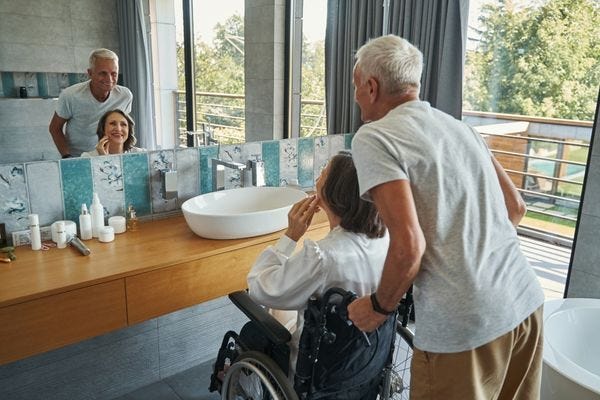

It also leads to hard stool that weakens rectum muscles, leading to the inability to make bowel movements.
- Urinary tract infections (UTIs). UTIs are common in older people and cause a person to experience frequent urges to urinate and urine leakage.
- Communication issues. The inability to communicate the need for a restroom may lead to more accidents, especially if a person has reduced mobility.
- Medication side effects. Some medications a person with Alzheimer’s may be taking can have side effects that cause incontinence.
15 Tips for Caregivers
Use these 15 expert tips to manage incontinence in people with Alzheimer’s.
1. Identify the Cause
Several things typically cause incontinence in those with Alzheimer’s disease. To find what’s causing your loved one's incontinence, take note of:
- When and how often accidents occur.
- Unusual behavioral changes, such as increased confusion or agitation.
- Medications and their side effects.
- Indicators of a UTI.
- Foods that irritate the bladder or bowels.
- Fluid intake at night.
- Obstacles on the way to the bathroom.


If you can’t identify the cause of incontinence, visit your healthcare professional.
2. Use Free Incontinence Products
Using adult incontinence products can relieve the stress of accidents and clean-ups. We recommend starting out with adult protective underwear because they look and feel like real underwear. It’s also a good idea to use terms such as “adult brief” and “protective underwear” rather than “diaper” or “pull-ups;” Improper terminology of incontinence products may prevent someone from using them.
Top-brand products, like those Aeroflow Urology supplies, are ultra-absorbent, preventing leaks from damaging clothes or furniture. Our high-quality products also minimize odors while keeping the wearer comfortable and dry. Aeroflow Urology currently offers the following products to those who qualify:
- Adult briefs (diapers).
- Adult protective underwear.
- Adult overnight briefs.
- Incontinence pads.
- Underpads
- Booster pads.
We have a variety of brands and styles of products to choose from, depending on your loved one’s insurance plan.
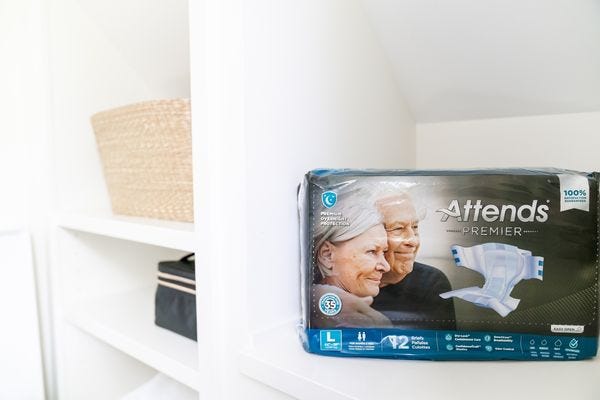

If they are eligible to get their supplies covered by insurance, we will:
- Assist in finding the perfect product and size for your loved one’s unique needs.
- Send you free product samples.
- Ship your loved one’s supplies directly to their home every month for free.
- Send friendly reminders when it’s time to refill your loved one’s supplies.
If you’d like to learn more about Aeroflow Urology’s services and products, visit our How It Works page or fill out the brief Eligibility Form to see if your loved one qualifies!
3. Be Discreet & Calm
Accidents can be embarrassing for anyone in any situation, so be sure you’re speaking to your loved one discreetly and calmly when addressing leaks. If you’re in public and an accident occurs, tell your loved one it’s time to change clothes and find a restroom. If accidents occur at home, calmly bring attention to soiled clothing and help them clean up and change.
4. Educate Yourself
Learning about the signs and symptoms of incontinence and the different types is an excellent way to prepare for dementia care.
5. Prepare for Accidents
When leaving the house or care home, be prepared for accidents!
Pack a bag that includes:
- An extra pair of pants, underwear, and a shirt in case of accidents.
- Extra incontinence products.
- Wipes and gloves for clean-ups.
- Sanitary towels.
- A water bottle to hydrate and decrease the risk of UTIs.
- Necessary medications.
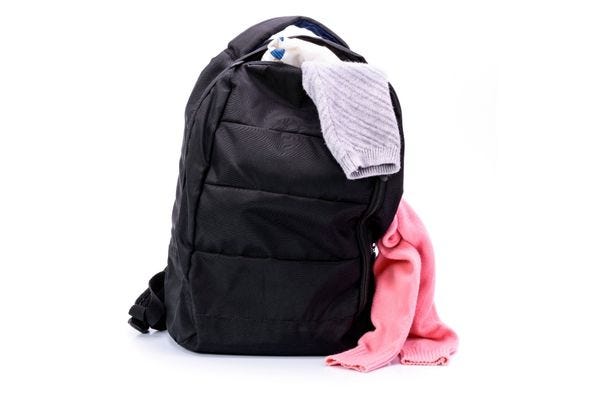

6. Schedule Bathroom Trips
Bathroom schedules work well for those who can no longer use the toilet on their own. Plan to take your loved one to the restroom every 2 hours and narrate step-by-step throughout the toileting process. Stick to this toileting schedule to avoid confusion and prevent accidents.
7. Make the Bathroom Comfortable
Install grab bars and padded toilet seats, and keep toilet paper and wipes where your loved one can reach them without straining themselves.
8. Use Bed Pads at Night
Bed pads are highly absorbent, so they will keep your loved one dry at night. Find out if they are eligible to get the cost of bad pads covered by insurance today.
9. Make Finding the Bathroom Easy
If your loved one can still use the bathroom on their own but forgets where it is, use these tips to help them locate it.
- Keep the bathroom door open at all times.
- Use nightlights to brighten up hallways at night.
- Move any obstacles out of the way.
- Create a pathway to the bathroom on the floor with signs or tape.
- Install extra lighting near the toilet.
- Hang pictures of a toilet on the bathroom door.
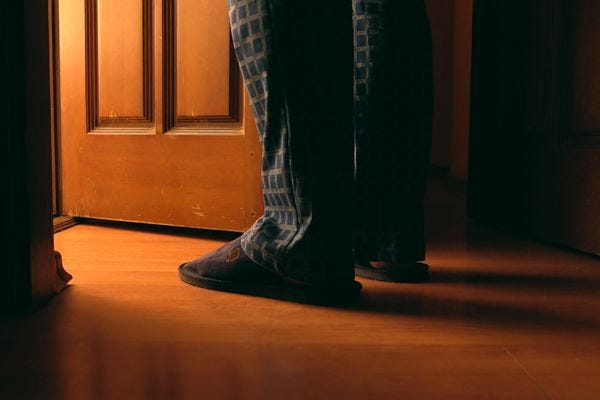

10. Visit the Doctor
If incontinence suddenly arises and you can’t identify the cause, take your loved one to see their healthcare provider.
11. Respect Privacy
Needing assistance while using the toilet is a significant adjustment that may take you and your loved one time to get used to. If your loved one is still using the bathroom but needs some help, respect their privacy by turning away while they void or leaving the bathroom when they want to be alone.
12. Protect Furniture With Pads
Protect furniture with underpads if your loved one has frequent accidents that leak through their incontinence product. You can also use underpads for longer car rides to keep car seats dry.
13. Watch for Signs
Be aware of physical signals your loved one gives off that indicate a full bladder or soiled clothing. Watch for:
- Holding genitals.
- Pulling at pants or clothes.
- Pacing
- Crossing legs.


14. Use Comfortable Clothing
Certain types of clothing can be complex for people with Alzheimer’s to take on and off.
Avoid:
- Buttons
- Snaps
- Ties
- Clothes that are too tight or stiff.
- Underwear made with heavy fabric.
Instead, use comfortable and easy-to-wear clothing, such as:
- Pants with elastic waistbands that can be taken off quickly.
- Cotton underwear.
- Pants with velcro fasteners.
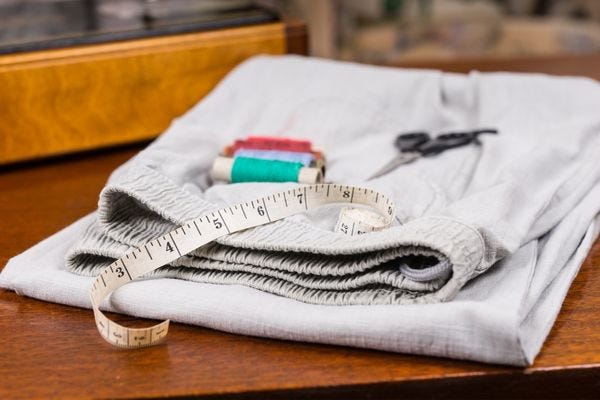

15. Communicate Openly
To avoid accidents, communicate openly about bathroom use in a respectful way. If your loved one is nonverbal due to the progression of Alzheimer’s, find other ways to communicate, such as using hand signals or pictures.
Savory, G. (2017, April 6). Alzheimer’s Disease And Incontinence. Bladder & Bowel Community. https://www.bladderandbowel.org/associated-illness/alzheimers-and-incontinence/
Toilet problems and continence. (2019). Alzheimer’s Society. https://www.alzheimers.org.uk/get-support/daily-living/toilet-problems-continence
Information provided on the Aeroflow Urology blog is not intended as a substitute for medical advice or care from a healthcare professional. Aeroflow recommends consulting your healthcare provider if you are experiencing medical issues relating to incontinence.







